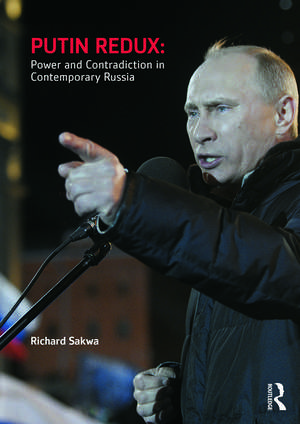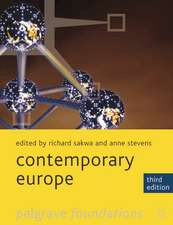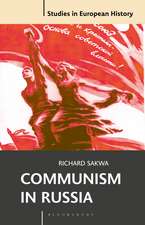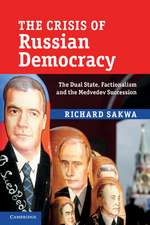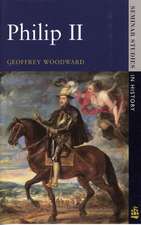Putin Redux: Power and Contradiction in Contemporary Russia
Autor Richard Sakwaen Limba Engleză Paperback – 19 mai 2014
However, this is not a new edition of the earlier books but is an entirely new work. The focus now is on the dilemmas of power since 2008. There is a brief biographical sketch of Vladimir Putin and much analysis of his ideas and policies, but the book now focuses on the systemic contradictions that have created a blockage on modernisation and a stalemate in politics, Putin's role as Prime Minister since 2008 and his political successes and failures, analysis of the implications of Putin's third term as President and the 2011-12 electoral cycle and the ensuing crisis which led to thousands protesting on the streets
This work assesses the achievements and failing of Putin’s rule, but above all tries to make sense of contemporary developments. This is the definitive account of Putin and is essential reading for all scholars and students of Russian politics.
| Toate formatele și edițiile | Preț | Express |
|---|---|---|
| Paperback (1) | 481.31 lei 6-8 săpt. | |
| Taylor & Francis – 19 mai 2014 | 481.31 lei 6-8 săpt. | |
| Hardback (1) | 1110.74 lei 6-8 săpt. | |
| Taylor & Francis – 19 mai 2014 | 1110.74 lei 6-8 săpt. |
Preț: 481.31 lei
Nou
Puncte Express: 722
Preț estimativ în valută:
92.10€ • 96.16$ • 76.22£
92.10€ • 96.16$ • 76.22£
Carte tipărită la comandă
Livrare economică 05-19 aprilie
Preluare comenzi: 021 569.72.76
Specificații
ISBN-13: 9780415630979
ISBN-10: 0415630975
Pagini: 262
Ilustrații: 3 black & white tables
Dimensiuni: 156 x 234 x 18 mm
Greutate: 0.42 kg
Ediția:1
Editura: Taylor & Francis
Colecția Routledge
Locul publicării:Oxford, United Kingdom
ISBN-10: 0415630975
Pagini: 262
Ilustrații: 3 black & white tables
Dimensiuni: 156 x 234 x 18 mm
Greutate: 0.42 kg
Ediția:1
Editura: Taylor & Francis
Colecția Routledge
Locul publicării:Oxford, United Kingdom
Public țintă
General, Postgraduate, and UndergraduateCuprins
1. Contradictions of Putinism Rise to the top; Putin’s statecraft; The Putin puzzle; Six pillars of power; Modalities of power, 2. Crisis of modernisation Stalemate and development; What sort of modernisation?; Social development and political change; How many Russias?; Powerlessness and corruption; The authoritarian social contract and rentierism 3. The impasse of power The dual state: constitutional state vs. administrative regime; Socio-economic stalemate; The third state: reality vs. appearance; Contesting epistemes; Beyond the impasse 4. On the eve What did Medvedev do?; Luzhkov’s dismissal; The dual campaign; party moves; Medvedev on the edge; Putin or Medvedev? 5. Putin’s constitutional coup The September coup; Parliamentary election; Protest and counter-protest; Putin’s response; Medvedev’s counter-coup 6. Putin’s return Putin’s bind; Crisis and reform; Putin’s programme; The presidential election; Putin’s return; Back in the driving seat 7. Tightening the screws 8. Coercion; Constraints; Co-optation; Conviction; Demedvedisation 9. The new traditionalism and regime reset 10. Putin’s statecraft in crisis; The Putin doctrine; Rebalancing the power system; Elections in Putin’s third term; Regime reset 11. Conclusion: Respice finem
Notă biografică
Richard Sakwa is Professor of Politics at the University of Kent, UK.
Recenzii
'Richard Sakwa’s Putin: Russia’s Choice is the best book in English on Putin’s presidency by one of the world’s leading authorities on contemporary Russian politics. Sakwa’s analysis of Putin is sympathetic but he is not blind to the many problems and failures that have marred Russia’s progress away from the chaos of the Yeltsin era. Sakwa cuts through the hype of the pro- and anti-Putin camps to weigh up both the degradation of democracy under Putin and the possibilities for democratic evolution. Importantly, as the end of Putin’s second presidential term nears, Sakwa allows us a glimpse of how Russia might develop beyond Putin and, perhaps, without him.' - Neil Robinson, University of Limerick, Ireland
'Richard Sakwa's latest book is the best short text in print on Russian politics in the Putin era. It presents Putin as a Jacobin state builder and on the whole as an effective reformer, but does not spare criticism or analysis of Putin's and Russia's many contradictions. I cannot think of a better starting point for understanding Russian and Eurasian politics in the second post-communist decade.' - Timothy Colton, Harvard University, USA
'In this second edition of his classic analysis of Putin’s Russia, Richard Sakwa again challenges those who are too quick and willing to condemn the Soviet president as anti-democratic and a traditional autocratic Russian leader. Sakwa writes in his usual deceptive style – his prose is clear and might initially appear straightforward, but in fact conveys highly sophisticated and complex arguments. This book will not appeal to simplistic souls who want to see the world in black-and-white, ‘good guys and bad guys’ terms. Rather, it will attract those who can handle complexity and contradictions – the reality of politics, whether in Russia or anywhere else. And it will appeal to those who want a deeper understanding of the leader of one of the world’s most significant states, one that is becoming increasingly influential again in world affairs.' - Leslie Holmes, University of Melbourne, Australia
'The main accomplishment of this book is that it sheds much light on the rationale behind Putin’s policies, in part by deviating from more conventional explanations that assume the authoritarian nature of political development in Russia. Besides, the book is a rich source of factual information about the Putin years—so far. Since the Putin era appears to be far from over, even when a formal shift of power has occurred, this will remain an important textbook for many years to come.' - Max Bader, Europe-Asia Studies
'Sakwa (Univ. of Kent, UK) has written a very impressive book that focuses on what happened in Russian politics from 2008 through 2013. Sakwa's skillful analysis of how Putin handled the challenge from various opposition groups is another merit of this study. The current crisis in Ukraine began after this book was written; it will be interesting to see how Sakwa's future works on the Russian political picture will account for this crisis.Summing Up: Recommended. Upper-division undergraduate, graduate, research, and professional collections.' --Y. Polsky, West Chester University of Pennsylvania, CHOICE
'Richard Sakwa's latest book is the best short text in print on Russian politics in the Putin era. It presents Putin as a Jacobin state builder and on the whole as an effective reformer, but does not spare criticism or analysis of Putin's and Russia's many contradictions. I cannot think of a better starting point for understanding Russian and Eurasian politics in the second post-communist decade.' - Timothy Colton, Harvard University, USA
'In this second edition of his classic analysis of Putin’s Russia, Richard Sakwa again challenges those who are too quick and willing to condemn the Soviet president as anti-democratic and a traditional autocratic Russian leader. Sakwa writes in his usual deceptive style – his prose is clear and might initially appear straightforward, but in fact conveys highly sophisticated and complex arguments. This book will not appeal to simplistic souls who want to see the world in black-and-white, ‘good guys and bad guys’ terms. Rather, it will attract those who can handle complexity and contradictions – the reality of politics, whether in Russia or anywhere else. And it will appeal to those who want a deeper understanding of the leader of one of the world’s most significant states, one that is becoming increasingly influential again in world affairs.' - Leslie Holmes, University of Melbourne, Australia
'The main accomplishment of this book is that it sheds much light on the rationale behind Putin’s policies, in part by deviating from more conventional explanations that assume the authoritarian nature of political development in Russia. Besides, the book is a rich source of factual information about the Putin years—so far. Since the Putin era appears to be far from over, even when a formal shift of power has occurred, this will remain an important textbook for many years to come.' - Max Bader, Europe-Asia Studies
'Sakwa (Univ. of Kent, UK) has written a very impressive book that focuses on what happened in Russian politics from 2008 through 2013. Sakwa's skillful analysis of how Putin handled the challenge from various opposition groups is another merit of this study. The current crisis in Ukraine began after this book was written; it will be interesting to see how Sakwa's future works on the Russian political picture will account for this crisis.Summing Up: Recommended. Upper-division undergraduate, graduate, research, and professional collections.' --Y. Polsky, West Chester University of Pennsylvania, CHOICE
Descriere
This political biography of Vladimir Putin builds on the strengths of the previous volumes by the same author to provide the most detailed and nuanced account of the man, his politics and his profound influence on Russian politics, foreign policy and society.
